Founding Fathers of the United States
[2] Most of the Founding Fathers were of English ancestry, though many had family roots extending across various regions of the British Isles, including Scotland, Wales, and Ireland.[8][24][25][26] Since the 19th century, the Founding Fathers have shifted from the concept of them as demigods who created the modern nation-state, to take into account their inability to address issues such as slavery and the debt owed after the American Revolutionary War.[32][33] In 1811, responding to praise for his generation, John Adams wrote to a younger Josiah Quincy III, "I ought not to object to your Reverence for your Fathers as you call them ... but to tell you a very great secret ...According to the Archives, these documents "have secured the rights of the American people for nearly two and a half centuries and are considered instrumental to the founding and philosophy of the United States.[44][45] As a result, signers of three key documents are generally considered to be Founding Fathers of the United States: Declaration of Independence (DI),[21] Articles of Confederation (AC),[23] and U.S. Constitution (USC).[134] In response, Parliament passed the Coercive or Intolerable Acts, a series of punitive laws that closed Boston's port and placed the colony under direct control of the British government.[131] Intent on responding to the Acts, twelve of the Thirteen Colonies agreed to send delegates to meet in Philadelphia as the First Continental Congress, with Georgia declining because it needed British military support in its conflict with native tribes.By 1774, however, letters published in colonial newspapers, mostly by anonymous writers, began asserting the need for a "Congress" to represent all Americans, one that would have equal status with British authority.In the wake of the Intolerable Acts, at the hands of an unyielding British King and Parliament, the colonies were forced to choose between either totally submitting to arbitrary Parliamentary authority or resorting to unified armed resistance.The Declaration and its boycott directly challenged Parliament's right to govern in the Americas, bolstering the view of King George III and his administration under Lord North that the colonies were in a state of rebellion.[150] Lord Dartmouth, the secretary of state for the colonies who had been sympathetic to the Americans, condemned the newly established Congress for what he considered its illegal formation and actions.In January 1775, Gage's superior, Lord Dartmouth, ordered the general to arrest those responsible for the Tea Party and to seize the munitions that had been stockpiled by militia forces outside of Boston.During their march to Lexington and Concord on the morning of April 19, 1775, the British troops encountered militia forces, who had been warned the night before by Paul Revere and another messenger on horseback, William Dawes.Finally, on June 14 Congress approved provisioning the New England militias, agreed to send ten companies of riflemen from other colonies as reinforcements, and appointed a committee to draft rules for governing the military, thus establishing the Continental Army.[165] To satisfy the former, Congress adopted the Olive Branch Petition on July 5, an appeal for peace to King George III written by John Dickinson.[176][177][171] While the colonists were fighting the British to gain independence their newly formed government, with its Articles of Confederation, were put to the test, revealing the shortcomings and weaknesses of America's first Constitution.[182] After the war, Washington was instrumental in organizing the effort to create a "national militia" made up of individual state units, and under the direction of the federal government.[190][191][192] Key leaders – George Washington, Thomas Jefferson, Alexander Hamilton, James Madison, and others – began fearing for the young nation's fate.[197][192] Many delegates were late to arrive, and after eleven days' delay, a quorum was finally present on May 25 to elect Washington, the nation's most trusted figure, as convention president.[229][230] Even Madison, the Constitution's chief architect, was dissatisfied, particularly over equal representation in the Senate and the failure to grant Congress the power to veto state legislation.[238] Despite unanimous votes in New Jersey and Georgia, several key states appeared to be leaning against ratification because of the omission of a Bill of Rights, particularly Virginia where the opposition was led by Mason and Patrick Henry, who had refused to participate in the convention claiming he "smelt a rat".[254] Jefferson, while in France, shared Henry's and Mason's fears about a strong central government, especially the president's power, but because of his friendship with Madison and the pending Bill of Rights, he quieted his concerns.[386][387] Historian Gregg L. Frazer argues that the leading founders (John Adams, Jefferson, Franklin, Wilson, Morris, Madison, Hamilton, and Washington) were neither Christians nor Deists, but rather supporters of a hybrid "theistic rationalism".[392][393][394] Jefferson was the architect for separation of Church and State, which opposed the use of public funds to support any established religion and believed it was unwise to link civil rights to religious doctrine.Determined to keep open a market where Men should be bought & sold, he has prostituted his negative for suppressing every legislative attempt to prohibit or restrain this execrable commerce.When Jefferson entered public life as a member of the House of Burgesses, he began as a social reformer by an effort to secure legislation permitting emancipation of slaves.[419] Biographer David Blight states that Frederick Douglass, "played a pivotal role in America's Second Founding out of the apocalypse of the Civil War, and he very much wished to see himself as a founder and a defender of the Second American Republic."[420] Constitutional provision for racial equality for free blacks was enacted by a Republican Congress led by Thaddeus Stevens, Charles Sumner and Lyman Trumbull.Ellis says the founders, or the fathers comprised an aggregate of semi-sacred figures whose particular accomplishments and singular achievements were decidedly less important than their sheer presence as a powerful but faceless symbol of past greatness.For the generation of national leaders coming of age in the 1820s and 1830s, such as Andrew Jackson, Henry Clay, Daniel Webster, and John C. Calhoun, the founders represented heroic but anonymous abstraction whose long shadow fell across all followers and whose legendary accomplishments defied comparison.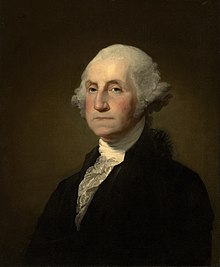
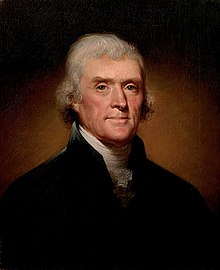

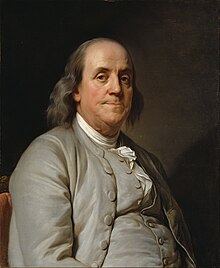
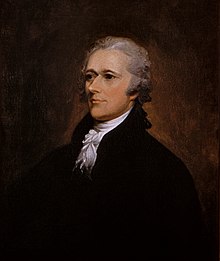
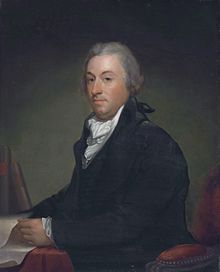


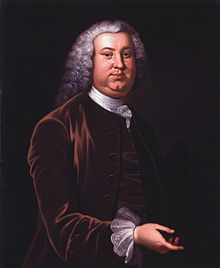

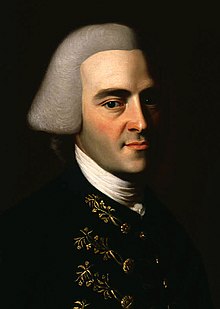

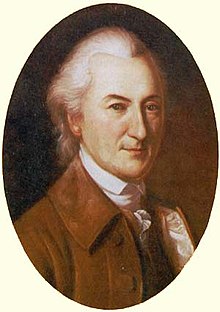



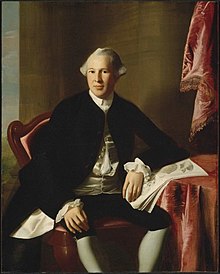






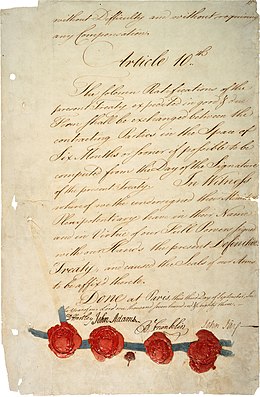



List of national foundersCommittee of FiveLivingstonShermanJeffersonFranklinDeclaration of IndependenceSecond Continental CongressJohn Trumbull1819 portraitThe Thirteen ColoniesArticles of ConfederationUnited States ConstitutionJohn AdamsSamuel AdamsBenjamin FranklinAlexander HamiltonJohn HancockJohn JayThomas JeffersonPatrick HenryRichard Henry LeeRobert R. LivingstonJames MadisonGeorge MasonRobert MorrisPeyton RandolphRoger ShermanGeorge WashingtonStamp ActBoston Tea PartyIntolerable ActsAmerican Revolutionary WarLee ResolutionTreaty of ParisBill of RightsHistory of the United StatesU.S. ConstitutionPhiladelphiaHoward Chandler ChristyTimeline and periodsPrehistoricPre-Columbian EraColonial Era1776–1789American RevolutionConfederation period1789–1815Federalist EraJeffersonian Era1815–1849Era of Good FeelingsJacksonian Era1849–1865Civil War Era1865–1917Reconstruction EraGilded AgeProgressive Era1917–1945World War IRoaring TwentiesGreat DepressionWorld War II1945–1964Post-World War II EraCivil Rights Era1964–1980Vietnam War1980–1991Reagan Era1991–2008Post-Cold War Era2008–presentAmerican CenturyAntisemitismCivil unrestRacial violenceCulturalCinemaNewspapersSportsDemographyImmigrationEconomyBankingEducationHigher educationGovernmentAbortionCapital punishmentCivil rightsCorruptionThe ConstitutionDebt ceilingDirect democracyForeign policyLaw enforcementPostal serviceTaxationVoting rightsJournalismMaritimeMilitaryMarine CorpsAir ForceSpace ForceCoast GuardParty SystemsSecondFourthReligionSocial classSlaverySexual slaveryTechnology and industryAgricultureLumberMedicineRailwayAfrican AmericanAsian AmericanChinese AmericanFilipino AmericanIndian AmericanJapanese American